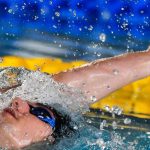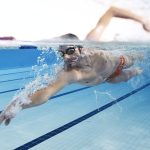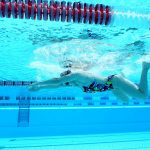How Emily Seebohm learnt to win under pressure
For Emily Seebohm the World Championships were a breakthrough after a number of heartbreaking near misses at major competitions.
The Australian was second in the 100m backstroke at both the 2012 Olympics and the 2013 World Championships.
Emily was distraught with her second place in London three years ago but sports psychology work helped release her inner champion in Kazan.
First up was victory in the 100m before she returned to take the 200m title and seal the backstroke double.
Now she has a winning mindset that she is not going to lose going into next year’s Olympics in Rio de Janeiro.
“It is something I’ve got now, and I feel I can’t lose that and I’ll go back from this and train as hard as I can because we all know how much I want that Olympic gold and that will just be a fantastic result for me,” she beamed.
“I feel I have always had it in me – it’s just that I’ve never been able to push to that next level but I think after this meet it will always be remember what I could do here under all that pressure .
“It is definitely something I can take into Rio and have in my mind so I think I will definitely feel more comfortable.”

Learning to win under pressure has been a long journey for Emily but her double in Russia proved she can succeed under the weight of expectation.
“I definitely have to be more relaxed and I guess dealing with pressure has just been fantastic because it’s really stepped me up so much in my preparation for Rio.
“It’s helped so much with dealing with me and my thoughts, dealing with even going in as the 100 backstroke world champion that was more pressure itself.
“So it was a great race to pull out because if anything there was more pressure on me this time than there was before and I think I just want to show I can deal with that and it just helps fuel the fire I guess.”
Emily explained the approach she has learned to take under sports psychologist Georgia Ridler which involves work on concentration, focus and avoiding distraction.
“She does a lot of quiet mind sessions where she helps us learn techniques to switch our minds off and she gave us this technique that I will remember for ever.
“You have got to breathe in and think of one thing you want to leave in that room and for me it was leaving the fact I did such a good result in the 100 and leaving that in there and not thinking about that again.
“So I hadn’t thought that much about it, I gave my medals to mum and dad so I didn’t have that as a reminder a well – I wanted to focus every day as being the first of competition.
“We call it day 1.7 – it’s not day seven, it’s still day one.”
—————
Written by:
Elizabeth Byrnes
Liz swam with a local club in Sheffield, England, as a child before retiring at the grand old age of 12. Her lifelong love of the water, combined with a passion for travel, has seen Liz plunge into pools across the world. Liz spent 12 years with the Press Association reporting on swimming and athletics at Olympic and World level but is now fulfilling a dream as a freelance writer. When not in or around the water, she can be found hiking, running and cycling.







